
“Bless the Lord, O my soul, and all that is within me, bless His holy name. Bless the Lord, O my soul, and forget none of His benefits.” (Psalm 103:1–2)
Did you know there is a Jewish blessing for everything!
Even if you see someone pretty or handsome, there’s a quick prayer of blessing you can say to the One who created them!
It’s humbling to see Orthodox Jews standing at a water cooler filling up a glass of water.
Before they take a sip, they say a short prayer (blessing) to thank the Creator even for the most basic thing in life, water.

An Orthodox Jewish man drinks from a water fountain in Jerusalem.
It makes one think . . . when did I ever thank God before drinking a glass of water?
Most Orthodox Jews try to recite at least 100 blessings a day.
This need to bless the Lord for everything has evolved partly from the instructions of Moses to the Israelites in the wilderness, from King David’s Psalm 103, and other teachings over the centuries.
Let’s see what it means to bless the Lord and how we can do that in good times and bad.

A Blessing for Everything
Judaism is very liberating in the sense that nothing belongs to us; everything belongs to God. As the sages have written:
“If you enjoy something in this world without saying a blessing, it is as if you stole it” (Talmud Berachot 35A).
So, Jewish people are constantly blessing the Lord, beginning their praise of thanks with these familiar words:
Baruch Atah Adonai Eloheinu, Melech Ha Olam…
. . . ברוך אתה יי אלוהינו מלך העולם
Blessed are You O Lord our God, King of the Universe…
When we bless, we show gratitude to God for everything and at all times, not taking anything for granted.

An African tourist kneels in prayer at the Western (Wailing) Wall.
In Hebrew, to bless is varak בָרַךְ, which means to kneel. It is related to the word for knee: berech בֶּרֶךְ.
The broader meaning of varak includes to bow in adoration, to praise, congratulate, honor, salute, and to thank God.
As we humble ourselves before God and honor Him as our source of all things, we also bless Him by not behaving as though we achieved our blessings by ourselves.
Moses warned the Israelites,
“You may say to yourself, ‘My power and the strength of my hands have produced this wealth for me.’ But remember the Lord your God, for it is He who gives you the ability to produce wealth, and so confirms His covenant, which He swore to your ancestors, as it is today” (Deuteronomy 8:17).
So, Moses instructs the Israelites to bless the Lord. Some Bible translations use the word praise instead of bless:
“When you have eaten and are satisfied, praise (varak) the Lord your God for the good land he has given you” (Deuteronomy 8:10).
Moses further warned the people that if they choose to worship foreign gods, they would not be blessed as a nation, but be destroyed (Deuteronomy 8:18–19).
So, it was critically important that the Jewish People constantly remember the One who was sustaining them while they wandered through the wilderness and after they entered the Promised Land.
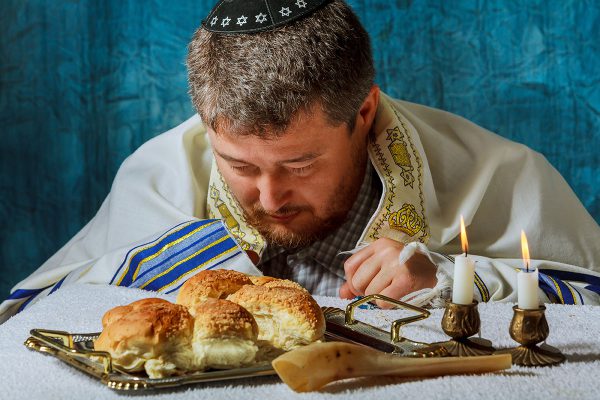
Jewish man prays the traditional blessing over challah (egg bread): Baruch atah, Adonai Eloheinu, Melech haolam, haMotzi lechem min haaretz. — Blessed are You, Lord our God, King of the Universe, who brings forth bread from the earth.”
Remembering, Thanking, Loving Him
When David began Psalm 103 by writing, “Bless the Lord Oh my soul!” he was speaking to all of himself — his mind, will, and emotions.
Blessing the Lord with his whole being was a conscious decision David had to make. And we have to make it, too.
We often read in Scripture about “singing a new song” to the Lord, patiently waiting on Him, and dwelling in His presence.
We can remember Him in quiet adoration, kneeling before God, or dancing with joy in His honor!
And we can always give the Lord a Hallelujah!
In the Bible, the word Hallelujah — Hallel (praise) and Yah (short for YHVH) — means both blessings and praise to God.
The need to make a conscious decision to praise God is why the Jewish people use prayer tools like tefillin (phylacteries) and tallit (prayer shawls) to remind them of God’s Word (the Holy Scriptures) every day.
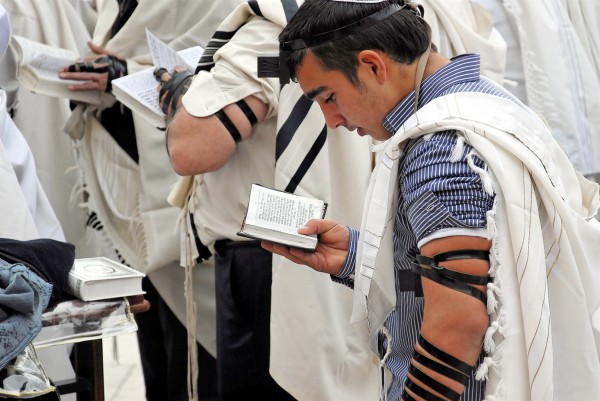
Jewish men pray with tefillin (phylacteries or leather boxes), which contain Scripture passages. They are worn in obedience to Exodus 13:9, 16 and Deuteronomy 6:8, 11:18, during most morning prayers. They are a tangible and symbolic means of harmonizing the mind, the heart and actions (deeds) with God’s Word.
The Medieval Jewish teacher, Maimonides also known as Rambam (1135–1204), tried to make this process easier by codifying the laws of berachot (blessings).
In his laws, he explains that each blessing must include: God’s name (often spoken as Adonai, which means Lord or Master), His sovereignty (often spoken as “King of the Universe”), and the subject of the blessing.
Blessings can be very specific or very general, such as this blessing:
“Blessed are You, LORD our God, King of the universe, through whose Word everything comes into being.”
And these blessings are not meant to be said only in prosperous times.
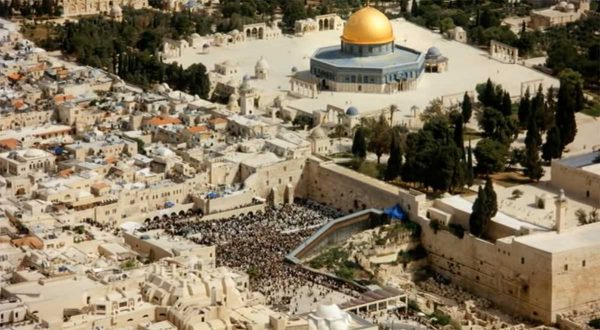
Aerial view of the Temple Mount and the Kotel (Western Wall) Plaza where a large crowd is gathered. (YouTube capture)
Blessing God in Good and Bad Times
Throughout the Bible, men and women continued to bless the Lord despite the difficult seasons of their lives.
The psalmist wrote: “I will bless the Lord at all times; His praise will continually be in my mouth” (Psalm 34:1).
This verse is a Hebrew “couplet” found many times in the literary structure of the psalms. It means that both sayings are equivalent, just expressed differently. For King David, to bless the Lord meant to always remember to praise Him with words and songs, whatever the circumstances.
As Believers in Yeshua (Jesus) we are also to remember that we are seated with our Messiah in Heavenly places (Ephesian 2:6).
Therefore, we should have His perspective — from the eternal throne room of heaven — and no longer the perspective of the world. Whatever is happening around us, all authority in heaven and on earth has been given to Messiah, and He is worthy of blessings and praise!
So, let’s look at some practical ways to see life from His perspective and keep blessing and praising His holy name, no matter what we are going through.

Israeli children water a tree they just planted.
Paying Attention to the Small Things
Often, in troubled times, we look for spectacular shows of God’s glory, His miracles. But many times, He likes to work in small ways, in seed form (as seeds planted in a garden that grow in size and fruitfulness). As Yeshua taught us:
“The kingdom of heaven is like a mustard seed, which a man took and planted in his field. Though it is the smallest of all seeds, yet when it grows, it is the largest of garden plants and becomes a tree, so that the birds come and perch in its branches” (Matthew 13:31–32).
What seed has God planted in your life that could grow into a mighty blessing (brachah), if you took the time to develop it with Him?
Once you find it, praise God for it.
When a Jewish person discovers something new and wonderful, no matter how small, he is to say the blessing of joy:
“Praised are You, the Eternal One our God, King of the Universe, who has kept us alive, sustained us, and enabled us to reach this moment.”
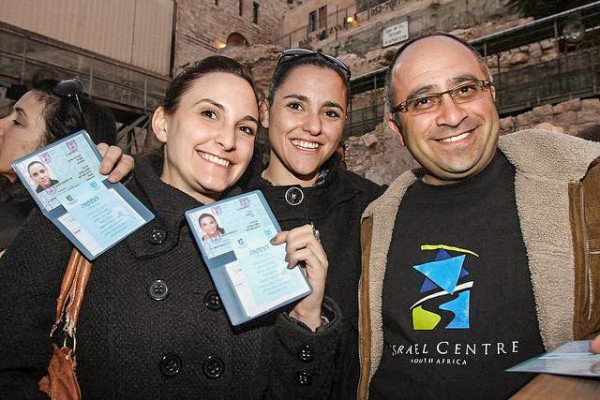
New olim (immigrants to Israel) proudly display their new identity cards (Teudat Zehut) in Jerusalem at the Western (Wailing) Wall.
Rejoicing in the Lord, for He Is Good!
Rabbi Shaul (Paul) was confined and in chains when he wrote these words:
“Rejoice in the Lord always; and again I say: Rejoice!” (Philippians 4:4).
When he and his friend Silas were shackled in chains for proclaiming Yeshua, they were rejoicing even at midnight in the jail cell! (Acts 16:25)

Paul and Silas in Prison (Providence Collection)
As they did, angels went to work, and soon enough, they were free!
Yet, even if they weren’t set free, we can expect they would have kept praising the Lord because the source of Paul’s joy even in shackles was the goodness of the Lord Himself, and he knew his pain was not in vain.
It was Paul who wrote: “And we know that in all things God works for the good of those who love him, who have been called according to his purpose” (Romans 8:28).
The Jewish Rabbi (Apostle Paul) who was raised as an Orthodox Jew rejoiced as David did, with his whole being, by singing to the Lord and writing about God’s goodness.
Paul also never missed an opportunity to share the love and truth of Messiah Yeshua with his jailors so that some might be saved.
A Jewish person today who is released from jail or healed from a sickness might say a blessing like this:
“Blessed are You, Lord our God, King of the Universe, Who bestows good things upon the unworthy, and has bestowed upon me goodness.”
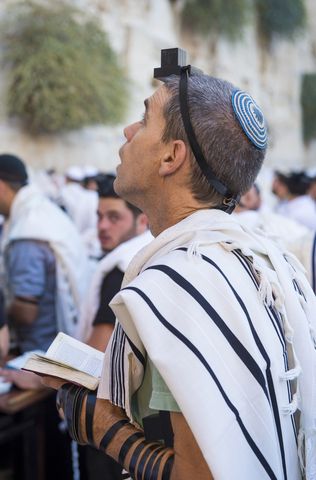
A young Jewish man prays at the Western Wall wearing tefillin (phylacteries) and a tallit (prayer shawl).
Looking UP!
When was the last time you noticed the sky or looked high up into a tree where birds are nesting?
We might be so used to our phone-driven lives, we need to consciously say to ourselves, “I must look up more often!”
This is what God wants for us:
“I lift my eyes to the hills; from where does my help come? My help comes from the Lord, the Maker of Heaven and earth” (Psalm 121:1–2).
By looking up, we become stronger and more confident so we can be victorious over our enemies. Rabbi Shaul (Paul) put it this way:
“Blessed be the God and Father of our Lord Yeshua the Messiah, who has blessed us with every spiritual blessing in the heavenly places in Messiah” (Ephesians 1:3).
When we show our confidence in Him with our whole being, it will be easier to see the blessings He has bestowed on us.
Those blessings include Ruach HaKodesh (the Holy Spirit) that lives in us, the power of God himself.
King David knew how critical that blessing is to our lives when he said to God, “Please do not take away Ruach Hakodesh’cha (Your Holy Spirit) from me” (Psalm 51).

The Jewish people bless God and pray daily for the Messiah to come.
And we can be confident that one day soon, all Jewish eyes will look up to see Messiah Yeshua come to establish His kingdom on earth, as Daniel saw in a vision:
“One like a son of man, coming with the clouds of heaven. He approached the Ancient of Days and was led into His presence. He was given authority, glory and sovereign power; all nations and peoples of every language served Him. His dominion is an everlasting dominion that will not pass away, and His kingdom is one that will never be destroyed” (Daniel 7:13–14).
At that same time, the prophecy of Zechariah 12:10, 13 is fulfilled. The people of Jerusalem will look upon Him who was pierced, and they will mourn for Him as an only child. But, then, one-third of them will go through the Refiner’s Fire receiving the Holy Spirit! It will be a day of blessing filled with joy.
And there is a Jewish blessing for that kind of joy!
“Blessed are you, God, King of the world, who has kept us alive and sustained us to arrive at this moment!”

If Paul were here today, he would ask you to help reach his Jewish people with the Good News.
Please take a moment to help our ministry in this kingdom work.





